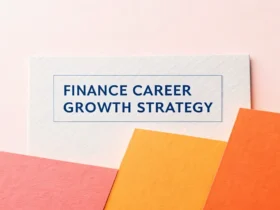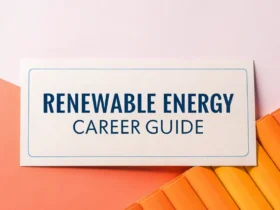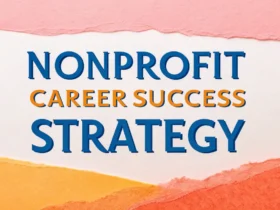Are you keen to find a career that helps protect our planet? The world of work is changing, and “going green” is more than just a trend. It’s a chance to make a real difference.
Want in?
This article will guide you through the rise of green jobs. We’ll explore what these jobs are, the skills you’ll need, and how you can find them. Whether you’re a student, a professional looking for a career change, or simply someone who cares about the environment, this guide is for you.
Get ready to discover how you can turn your passion for sustainability into a rewarding career.
Sustainability Careers on the Rise: Expert Guide
The Growing Demand for Green Jobs
The world faces some tough issues. Climate change, pollution, and loss of resources are things we must face. Because of this, there’s a big push for green ideas and green work. More and more, outfits need pros who know how to cut waste, save power, and come up with green plans.
Green jobs, once a niche area, are now in high demand. The need for these jobs grows each year, with more outfits trying to be eco-friendly.
Data shows this boom:
- A report by the International Renewable Energy Agency (IRENA) found that the renewable energy sector alone employed 12 million people worldwide in 2020, and that number is only set to rise.
- The U.S. Bureau of Labor Statistics projects that employment in solar photovoltaic installers and wind turbine service technicians will grow 68% and 61%, respectively, from 2020 to 2030 – much faster than the average for all occupations.
This rise isn’t just in green power. It’s all over, from farming to tech, from building to finance. As the world gets more aware of green issues, expect even more green jobs to pop up.
What Exactly Are Green Jobs?
What does “green job” even mean? A green job is any job that helps the world in some way. This could mean:
- Protecting the air, water, and land
- Saving power and cutting waste
- Creating green goods and services
- Educating folks about green living
Think of it as any work that leads to a more eco-friendly and sustainable world. This is way more than just being a solar panel installer or a park ranger.
Here’s a look at some areas where green jobs are popping up:
- Green Power: Solar, wind, hydro, and geothermal power. This area is booming as we move away from fossil fuels.
- Green Building: Creating eco-friendly homes and offices that save power and water.
- Green Transport: Working on electric cars, trains, and buses. Also, creating better public transport plans.
- Green Farming: Using ways to grow food that don’t harm the earth. This includes organic farming and saving water.
- Green Tech: Creating new tech to help solve green issues. This could be anything from better batteries to ways to clean up pollution.
- Green Finance: Investing in green outfits and plans. This helps move money to where it can do the most good for the earth.
The world of green jobs is wide open. No matter what your skills are, there’s likely a way you can use them to help the planet.
Types of Green Jobs: A Detailed Overview
Want to see what green jobs are out there? Here’s a look at some popular and growing green jobs:
Renewable Energy Engineer
These pros design, make, and test green power systems. They work on solar, wind, hydro, and other green power sources. Their work helps us use power in a cleaner way.
Skills Needed: A strong base in math and science. Also, you must know about power systems and green tech. It helps to have a degree in power engineering or a related area.
Environmental Scientist
These experts study the world around us. They look at pollution, waste, and other green issues. They come up with plans to protect the earth and its resources.
Skills Needed: A degree in science. Also, knowing about the law, policy, and ways to clean up the environment. It also helps if you can work well with others.
Sustainability Manager
These folks help outfits become more eco-friendly. They make plans to cut waste, save power, and lower their carbon use.
Skills Needed: Knowing about green practices and how outfits work. Also, being able to lead and talk to others. A degree in business or a green-related area is a plus.
Green Building Architect
These architects design homes and offices that are eco-friendly. They use green materials and plans that save power and water.
Skills Needed: Knowing about building design and green practices. Also, being able to use design tools. A degree in design is a must.
Conservation Scientist
These experts work to protect natural resources. They work with parks, forests, and other green areas to keep them healthy.
Skills Needed: A degree in science or a related area. Also, knowing about wildlife and land use. It also helps if you can work well with others.
Environmental Lawyer
These lawyers work on cases related to the environment. They help outfits follow green laws and fight for green causes.
Skills Needed: A law degree and knowing about environmental law. Also, being able to think fast and talk well.
Urban Planner
These planners work to make cities more eco-friendly. They make plans for better transport, green spaces, and waste plans.
Skills Needed: Knowing about city plans and green practices. Also, being able to work with others and see the big picture.
Water Resource Specialist
These experts manage and protect water resources. They work to make sure we have enough clean water for all.
Skills Needed: A degree in science or a related area. Also, knowing about water systems and ways to clean water.
Corporate Social Responsibility (CSR) Manager
These pros help outfits act in a socially responsible way. They make plans to help the earth and the local area.
Skills Needed: Knowing about green and social issues and how outfits work. Also, being able to lead and talk to others.
This is just a small sample. The world of green jobs is wide and growing. As we face new green issues, expect even more jobs to pop up.
Essential Skills for Landing a Green Job
To get a green job, you’ll need more than just a passion for the earth. You’ll also need some key skills. Here are some skills that can help you land a green job:
Technical Skills
Knowing the science and tech behind green solutions is key. This could mean knowing about green power systems, building design, or waste plans.
- Example: A green power engineer must know how solar panels work and how to make them more effective.
Analytical Skills
Being able to look at data and see trends is vital. This helps you find issues and come up with solutions.
- Example: An environmental scientist must be able to look at pollution data and find where it’s coming from.
Problem-Solving Skills
Green issues are often complex. You must be able to think outside the box and come up with new ways to solve them.
- Example: A water resource expert must find new ways to save water during a drought.
Communication Skills
Being able to talk to others about green issues is key. This includes writing reports, giving talks, and working with others.
- Example: A sustainability boss must be able to talk to workers about why green practices are vital.
Leadership Skills
Many green jobs need you to lead teams and projects. You must be able to inspire others and get things done.
- Example: An urban planner must lead a team to make a new transport plan for a city.
Knowledge of Regulations and Policies
Knowing about green laws and policies is vital. This helps you make sure outfits are following the rules.
- Example: An environmental lawyer must know about all the latest green laws.
Sustainability Principles
Having a strong base in sustainability ideas is key. This includes knowing about the economy, society, and the environment.
- Example: A CSR boss must know how to balance the needs of the outfit with the needs of the earth.
Adaptability
The green world is always changing. You must be able to learn new things and adjust to new ways.
- Example: A green tech expert must keep up with all the latest tech and ways to use it.
Passion and Dedication
Above all, you must care about the earth. Your passion will drive you to work hard and make a real impact.
- Example: A conservation scientist must be willing to work long hours to protect a rare species.
By building these skills, you can set yourself up for a great career in the green world.
Education and Training Pathways
Ready to get the training you need for a green job? Here are some paths you can take:
Bachelor’s Degrees
A four-year degree can give you a strong base for a green career. Some popular degrees include:
- Environmental Science: Study the earth and its issues.
- Environmental Engineering: Learn how to solve green issues with tech.
- Sustainability Studies: Learn about the economy, society, and the environment.
- Renewable Energy Engineering: Focus on green power systems.
- Urban Planning: Learn how to make cities more eco-friendly.
Master’s Degrees
A master’s degree can help you become an expert in a green area. Some popular degrees include:
- Environmental Management: Learn how to lead green programs.
- Sustainable Design: Focus on designing green homes and products.
- Renewable Energy Technologies: Learn about the latest green power tech.
- Climate Science: Study climate change and its impacts.
- Environmental Law: Focus on green laws and policies.
Vocational Training and Certifications
If you’re after hands-on skills, vocational training and certifications can be a good choice. Some popular options include:
- Solar Panel Installation Certification: Learn how to put up and fix solar panels.
- LEED Certification: Focus on green building design and practices.
- Energy Auditor Certification: Learn how to check homes and outfits for power waste.
- Wind Turbine Technician Certification: Learn how to keep wind turbines running.
- Organic Farming Certification: Focus on green ways to grow food.
Online Courses and MOOCs
For flexible learning, online courses and MOOCs (Massive Open Online Courses) are a great choice. You can learn at your own pace and focus on what interests you. Some popular platforms include:
- Coursera
- edX
- Udemy
- Khan Academy
These platforms offer courses on a wide range of green topics, from climate change to green building.
Internships and Volunteering
Getting real-world experience is key. Internships and volunteering can help you build skills and network with pros in the field. Look for chances with:
- Green outfits
- Govt. agencies
- Non-profits
Choosing the Right Path
The right path for you will depend on your goals, interests, and skills. Think about what you want to do and what skills you need. Do your research and talk to pros in the field to get advice.
Finding Green Job Opportunities
Ready to start your search? Here’s how to find green job chances:
Online Job Boards
Many websites focus on green jobs. Some popular options include:
- Green Dream Jobs
- EcoJobs
- Indeed
Use keywords like “sustainability,” “environmental,” and “renewable energy” to find relevant posts.
Company Websites
Check the websites of outfits that interest you. Many post job chances on their own sites. Look for outfits in areas like:
- Green power
- Green building
- Green tech
- Govt. agencies
- Non-profits
Networking
Talking to folks in the field can open doors. Attend green events, join online groups, and connect with pros on LinkedIn.
- Attend industry events and conferences
- Join green business groups
- Connect with pros on LinkedIn
Government Resources
Many govt. agencies offer resources for finding green jobs. Check out websites like:
- U.S. Environmental Protection Agency (EPA)
- U.S. Department of Energy (DOE)
- State and local govt. agencies
Tailoring Your Approach
When you apply for green jobs, tailor your approach to each job. Highlight your relevant skills, experience, and passion for the earth.
- Customize your resume and cover letter for each job
- Highlight your relevant skills and experience
- Show your passion for the earth
By using these tips, you can boost your chances of landing a great green job.
Salary Expectations in the Green Sector
What can you expect to earn in a green job? Pay can vary based on the job, your skills, and where you live. Here’s a general look:
Entry-Level Positions
Entry-level jobs may pay less at first. But they can be a great way to get your foot in the door. Some examples include:
- Environmental Technician: \$35,000 – \$50,000 per year
- Sustainability Coordinator: \$40,000 – \$55,000 per year
- Renewable Energy Installer: \$30,000 – \$45,000 per year
Mid-Level Positions
With some experience, you can move into mid-level roles. These jobs often pay more and offer more responsibility. Some examples include:
- Environmental Scientist: \$60,000 – \$80,000 per year
- Sustainability Manager: \$70,000 – \$90,000 per year
- Renewable Energy Engineer: \$75,000 – \$95,000 per year
Senior-Level Positions
Senior-level jobs often need a lot of experience and skills. These jobs pay the most and offer the most influence. Some examples include:
- Chief Sustainability Officer: \$120,000+ per year
- Environmental Director: \$100,000+ per year
- Renewable Energy Project Manager: \$90,000+ per year
Factors Affecting Salary
Several things can affect your pay in the green sector:
- Education: More education often leads to higher pay.
- Experience: More experience often leads to higher pay.
- Location: Some areas pay more for green jobs than others.
- Industry: Some green areas, like green tech, may pay more than others.
- Skills: Having in-demand skills can boost your pay.
Negotiating Your Salary
When you get a job offer, don’t be afraid to haggle. Research the average pay for your job in your area. Be ready to talk about your skills and experience.
- Research average salaries for your job and location
- Highlight your skills and experience
- Be confident and professional
By understanding pay expectations and factors, you can make sure you’re getting paid what you’re worth in the green sector.
Overcoming Challenges in the Green Job Market
While the green job market is growing, it’s not without its issues. Here are some common issues and how to beat them:
Competition
The green job market can be competitive. To stand out, focus on building your skills, getting experience, and networking.
- Focus on building in-demand skills
- Get real-world experience through internships and volunteering
- Network with pros in the field
Lack of Awareness
Many folks don’t know about green jobs or how to find them. Help spread the word by talking about green careers and sharing resources.
- Talk about green careers with friends, family, and colleagues
- Share resources on social media
- Mentor others who are interested in green jobs
Greenwashing
Some outfits may claim to be green but are not really doing much to help the earth. Watch out for “greenwashing” and do your research before taking a job.
- Research outfits before applying for jobs
- Look for signs of real commitment to sustainability
- Ask questions about green practices during the interview
Funding and Policy Changes
Green jobs can be affected by changes in govt. funding and policy. Stay up-to-date on the latest news and trends to be ready for changes.
- Stay up-to-date on the latest green news and trends
- Be ready to adjust to changes in funding and policy
- Be diverse in your skills to stay in demand
Skills Gap
Some outfits struggle to find workers with the skills they need. Focus on building in-demand skills and consider getting certifications to show your expertise.
- Focus on building in-demand skills
- Consider getting certifications to show your expertise
- Take online courses and attend workshops
Building a Resilient Career
To build a strong career in the green sector, focus on being flexible, learning new things, and staying true to your passion for the earth.
- Be flexible and open to new chances
- Keep learning and building your skills
- Stay true to your passion for the earth
By knowing these issues and how to beat them, you can set yourself up for a long and rewarding career in the green sector.
The Future of Green Jobs: Trends and Predictions
What does the future hold for green jobs? Here’s a look at some trends and predictions:
Continued Growth
Experts agree that the green job market will keep growing in the years ahead. As the world faces climate change and other green issues, the need for green solutions will only grow.
- Expect continued growth in areas like green power, green building, and green tech.
- New green jobs will emerge as we face new issues and chances.
Technological Advancements
Tech will play a big role in the future of green jobs. New tech will create new chances and change the skills that are in demand.
- Expect more jobs related to AI, data science, and automation in the green sector.
- Workers will need to keep learning and adapting to new tech.
Policy and Regulation
Govt. policies and rules will have a big effect on the green job market. Policies that support green energy, cut pollution, and promote sustainability will create more jobs.
- Keep up-to-date on the latest green policies and rules.
- Support policies that promote green jobs and sustainability.
Circular Economy
The circular economy, which focuses on cutting waste and reusing resources, will create new green job chances.
- Expect more jobs related to recycling, waste reduction, and product reuse.
- Workers will need to know about circular economy ideas and practices.
Social Justice
The link between green issues and social justice will become even stronger. Green jobs will need to address both environmental and social problems.
- Expect more jobs that focus on equity, inclusion, and environmental justice.
- Workers will need to know about social justice issues and how they relate to the environment.
Remote Work
Remote work is becoming more common in many areas, and the green sector is no exception. Remote work can open up new job chances and provide more flexibility.
- Look for remote green jobs on online job boards.
- Be ready to work with teams and clients from all over the world.
Adapting to Change
To thrive in the future of green jobs, workers will need to be flexible, keep learning, and stay true to their passion for the earth.
- Be flexible and open to new chances.
- Keep learning and building your skills.
- Stay true to your passion for the earth.
By knowing these trends and predictions, you can be ready for the future of green jobs and build a successful and impactful career.
Success Stories: Inspiring Examples of Green Careers
Want some motivation? Here are some inspiring stories of folks who have made a difference with green careers:
Emily Carter, Solar Energy Entrepreneur
Emily started her own solar panel outfit after working as a green power engineer. Her outfit now helps homes and outfits switch to green power.
- Emily saw a chance to help the earth and create jobs in her area.
- She combined her tech skills with her business smarts to build a successful outfit.
David Lee, Environmental Advocate
David is an environmental lawyer who fights for green causes. He has won several big cases that have protected natural resources and cut pollution.
- David used his law skills to make a real difference for the earth.
- He is passionate about justice and fighting for those who can’t protect themselves.
Maria Rodriguez, Urban Farming Innovator
Maria started an urban farm in a low-income area. Her farm provides fresh, healthy food to the local area and teaches folks about green farming.
- Maria saw a need for better food access in her area.
- She used her farming skills to create a sustainable solution that helps the earth and her local area.
John Smith, Corporate Sustainability Leader
John is the chief sustainability officer at a big outfit. He has led efforts to cut waste, save power, and lower the outfit’s carbon use.
- John used his leadership skills to make a big outfit more eco-friendly.
- He showed that sustainability can be good for both the earth and the bottom line.
Aisha Khan, Conservation Scientist
Aisha works to protect rare species in a national park. She studies the animals, manages their habitat, and educates the public about conservation.
- Aisha is passionate about wildlife and protecting the earth’s biodiversity.
- She used her science skills to make a real difference for endangered species.
Lessons from These Stories
These stories show that there are many ways to make a difference with a green career. Whether you’re an entrepreneur, a lawyer, a farmer, or a boss, you can use your skills to help the earth. The key is to find your passion, build your skills, and take action.
A Greener Future: Your Role in Sustainability
Sustainability is more than just a trend. It’s a way of life. By making green choices in your own life and pursuing a green career, you can help create a brighter future for all. It’s about finding ways to mesh what we need with what the planet can offer, ensuring resources are there for future generations too.
As you think about your role, here’s something worth pondering: What if every job, in some way, became a “green job?” It’s a grand goal, sure, but one worth striving for. Even small shifts can ripple outwards, shaping industries and mindsets.
So, as you mull over your next move, remember this: The green sector isn’t just about jobs. It’s about creating a world where we all thrive, in harmony with nature. Take that leap. Your planet—and future generations—will thank you.















Leave a Reply
View Comments